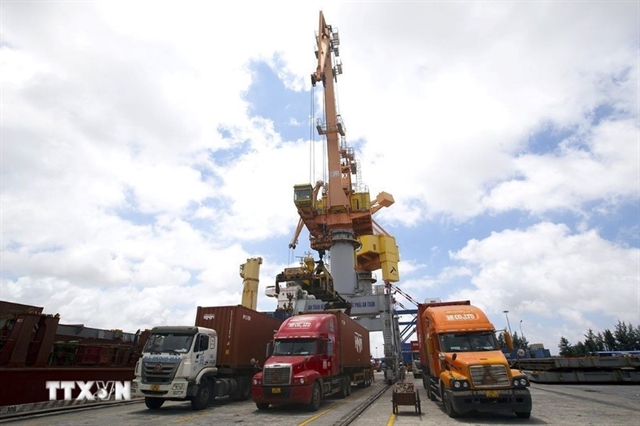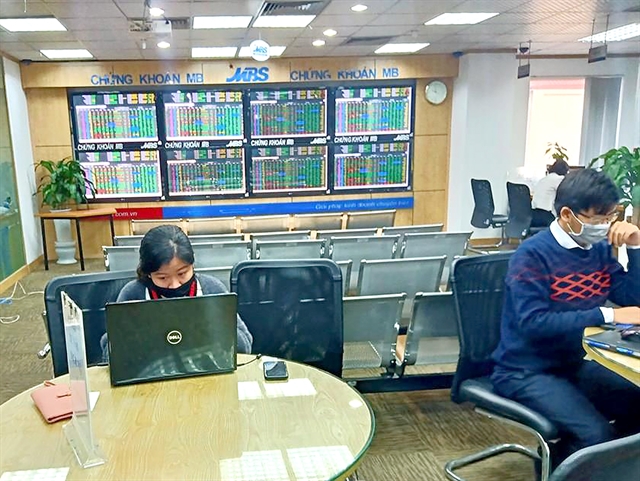 Economy
Economy


|
| Investors at the trading floor of MB Securities Co (MBS) in Hà Nội. Confidence in the Government’s anti-pandemic measures and expectations of a stronger economic recovery will give a boost to the market. VNA/VNS Photo Trần Việt |
HÀ NỘI — The Vietnamese stock market is forecast to prosper after the Tết (Lunar New Year) holiday in accordance with the strong growth of stock markets around the world, analysts said.
The benchmark VN-Index on the Hồ Chí Minh Stock market ended the last trading session before the Lunar New Year (February 10) up 2.93 per cent, closing at 1,114.93 points.
An average of 519.8 million shares were traded on the southern market on February 10, worth VNĐ7.3 trillion (US$317.8 million)
“The VN-Index increased gradually from the beginning of the morning session to the end of the afternoon session and was now back above the threshold of 1,100. Foreign investors were net sellers on both HSX and HNX. Besides, market breadth turned to a positive status with lower liquidity compared to the previous session,” said BIDV Securities Co.
“According to our assessment, the VN-Index may return to challenge its historic peak after the Lunar New Year,” the company said.
Nguyễn Duy Định, a senior customer care specialist at MB Securities Company (MBS), said that the cycle of many years shows that two weeks after the Lunar New Year, the market usually increases mainly thanks to the financial-banking stock group.
This year was a bit different because of the COVID-19 pandemic, he said, adding that the decrease in liquidity before the Lunar New Year was reasonable.
“Investors want to withdraw money before Tết, and the COVID-19 pandemic has slowed down the market in terms of transactions,” he said.
In fact, the rate of increase of the VN-Index in the first five sessions after the Tết holiday during the past 20 years accounts for about 65 per cent, higher than the rate of decline.
“For the last 20 years, the rate of the scenario in which VN-Index rising in the first five sessions after the Tết accounts for about 65 per cent, higher than the rate of decline,” he said.
“COVID-19 movements are not the main factors affecting the market because investors have experienced this frequently in 2020. Amid the pandemic, the market still recorded significant growth despite some sessions of strong declines,” said Phan Dũng Khánh, Maybank KimEng Vietnam Securities Company’s Director of Investment Advisory.
Khánh said that in the context of strong net-selling by foreign investors, institutional investors had not made significant changes to support the market. It was individual investors who were the main supporters of the market.
In January this year, the number of new accounts opened by individual investors reached the highest level in history. However, in February, the liquidity decreased continuously, showing that the cash flow of investors F0 could not be maintained, which can worry investors, he said.
Although the market is worrying, according to Khanh, there are still positive signs. Moreover, the news of social distancing in the whole of Hải Dương Province for 15 days and Hà Nội's closing of street restaurants and coffee shops from February 16, there are some investors who think that this may stimulate online transactions, like in April 2020.
SSI Securities Joint Stock Company (SSI) said that the 1,075 point area was a good support zone for the VN-Index and the index was likely to continue moving up to the resistance zone of 1,175 - 1,200 points.
“However, the trading volume needs to improve again for the index to officially return to the uptrend,” it said.
Yuanta Securities Vietnam Co said the market was likely to maintain its momentum in the early sessions of the Lunar New Year.
“At the same time, the market will enter an accumulation period, thus there will be differentiation between sectors with low liquidity," it said.
The company recommended short-term investors to continue taking advantage of corrections to increase their stock exposure and open new buying positions. — VNS




